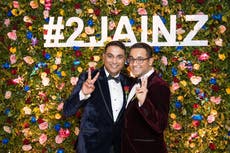‘British morality’ led to LGBT exclusion, India’s chief justice says
Nardenra Modi’s government says marriage equality is an ‘urban elitist’ concept
India’s inclusive culture accepting of same-sex love was stifled by the imposition of Victorian morality under British colonialism, according to the chief justice of the country’s Supreme Court.
The comments came as the court heard a series of pleas seeking legal recognition of gay marriages.
“It is the impact of British Victorian morality that we had to forsake much of our cultural ethos,” said chief justice DY Chandrachud, after solicitor general Tushar Mehta suggested the queer movement began in India around 2002.
“If you go to some of our finest temples, you will see sculptures and artworks that you will never say are lurid. Ours has been an educative culture, a profound one. From 1857 and the framing of the Indian Penal Code [the country’s criminal code], the code of Victorian morality was imposed on our inclusive, broad culture,” he was quoted as saying by The Hindu newspaper.
In 2017, India’s Supreme Court unanimously ruled in favour of decriminalising homosexuality by overturning an archaic colonial-era law.
The law, also referred to as Section 377, was the legacy of Tudor England’s Buggery Act 1533 introduced under Henry VIII.
While it had only ever been enforced in about 200 cases, it nevertheless enshrined the state’s official disapproval of LGBT+ sexualities and carried the threat of a 10-year prison sentence.
Now, a five-judge constitutional bench, comprising justices Chandrachud, Sanjay Kishan Kaul, S Ravindra Bhat, PS Narasimha and Hima Kohli, is hearing at least 20 petitions demanding marriage equality.
The hearing commenced on 18 April and entered day six on Thursday; it will resume on 3 May.
India’s government opposes the pleas, saying marriage equality represents an “urban elitist view for the purpose of social acceptance”.
Calling marriage “exclusively heterogenous,” it said the court should not try to judicially create a “new social institution”.
However, the court rejected the government’s submission, saying same-sex marriages cannot be termed “urban elitist concepts” just because more people from cities are coming out of the closet.
“Government does not have any data also to show that same-sex marriage is an urban elitist concept,” it said.
The petitioners, who include same-sex couples and rights activists, challenged the constitutionality pertaining to provisions of marriage laws on the ground that they deny same-sex couples the right to marry and requested the court to read these provisions broadly to make them inclusive.
Join our commenting forum
Join thought-provoking conversations, follow other Independent readers and see their replies
Comments




Bookmark popover
Removed from bookmarks